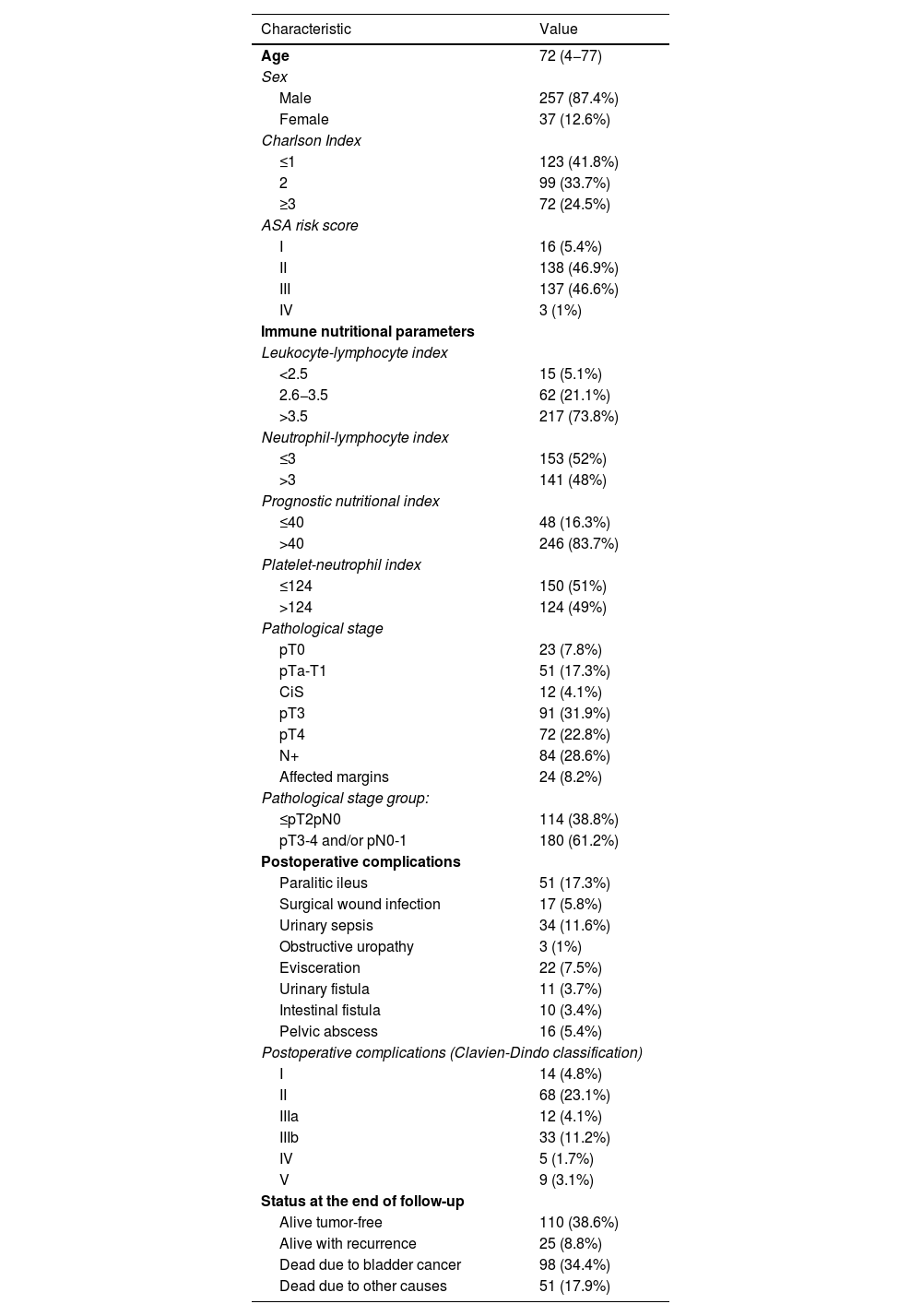Muscle-infiltrating bladder tumor (MIBT) has a recurrence-free survival (RFS) of 50% at 5 years. Although neoadjuvant chemotherapy (NCT) has increased it by 8%, which group of patients benefits the most from this treatment remains unclear.
ObjectiveEvaluate the prognostic value of immune-nutritional status in patients with MIBT who are candidates for cystectomy, and to develop a score that allows identifying patients with a worse prognosis (pT3-4 and/or pN0-1).
Material and methodsA retrospective analysis was carried out on 284 patients with MIBT treated with radical cystectomy. Preoperative laboratory tests were analyzed and immune-nutritional indices were calculated. The Kaplan–Meier method was used to calculate the PFS. Cox regression was used for multivariate analysis.
ResultsUnivariate analysis showed a statistically significant relationship with leukocyte/lymphocyte index (p = 0.0001), neutrophil/lymphocyte index (p = 0.02), prognostic nutritional index (p = 0.002), and platelet/lymphocyte ratio (p = 0.002). In multivariate analysis, the leukocyte/lymphocyte ratio (p = 0.002) and PNI (p = 0.04) behaved as independent prognostic factors of decreased RFS. Based on these, a prognostic score was developed to classify patients into 3 prognostic groups. Eighty percent of patients with pT3-4 and/or pN0-1 tumors were in the intermediate–poor prognostic groups.
ConclusionThe implementation of a precystectomy immune-nutritional score in clinical practice would help in the selection of a group of patients with a more unfavorable pathologic stage and worse PFS. We believe that these patients could benefit more from a NACT.
El tumor vesical músculo-infiltrante (TVMI) tiene una supervivencia libre de recidiva (SLR) del 50% a los cinco años, la quimioterapia neoadyuvante (QTN) ha aumentado la misma un 8%, pero no está claro qué pacientes se pueden beneficiar en mayor grado de la misma.
ObjetivoEvaluar el valor pronóstico del estado inmunológico-nutricional en los pacientes con TVMI candidatos a cistectomía, y desarrollar un score que permita identificar precistectomía a los pacientes con peor pronóstico (pT3-4 y/o pN0-1).
Material y métodoSe realizó un análisis retrospectivo de 284 pacientes con TVMI tratados con cistectomía radical. Se revisó la analítica preoperatoria y se calcularon índices inmunonutricionales. El método de Kaplan-Meier se utilizó para el cálculo de la SLR. Para el análisis multivariante se utilizó la regresión de Cox.
ResultadosMediante análisis univariante se observó una relación estadísticamente significativa con el índice leucocito/linfocito (p = 0,0001), el índice neutrófilo/linfocito (p = 0,02) el índice pronóstico nutricional (p = 0,002), y el ratio plaqueta/linfocito (p = 0,002). En análisis multivariante, el ratio leucocito/linfocito (p = 0,002) y el IPN (p = 0,04) se comportaron como factores pronósticos independientes de disminución de SLR, y se elaboró con ello un score pronóstico que divide a los pacientes en tres grupos pronósticos. El 80% de los pacientes con tumores pT3-4 y/o pN0-1 se encontraban en los grupos de pronóstico medio-malo.
ConclusiónLa incorporación en la práctica clínica de un score inmunonutricional precistectomía ayudaría a seleccionar a un grupo de pacientes con estadio patológico más desfavorable y peor SLR. Creemos que estos pacientes podrían beneficiarse en mayor medida de una QTN.











